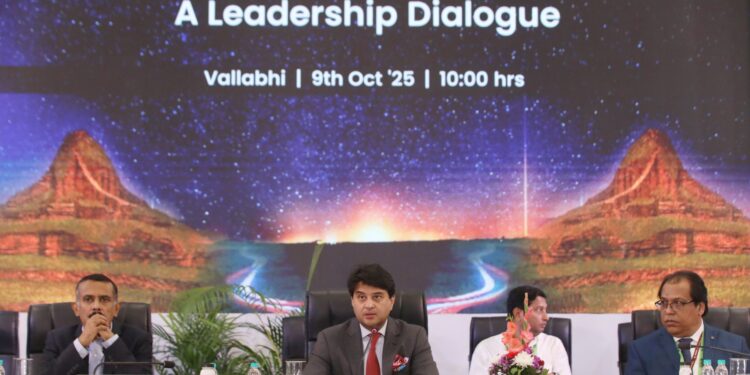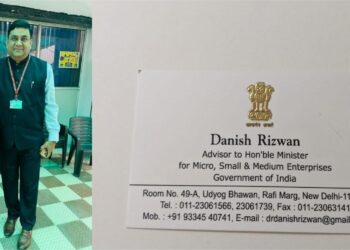Delhi: India’s transformation into a global digital powerhouse is being driven by entrepreneurs, startups, and a government that acts as a facilitator rather than a regulator, Union Minister for Communications and Development of North Eastern Region Jyotiraditya M. Scindia said Thursday at the India Mobile Congress (IMC) 2025.
“IMC 2025 heralds not only telecom but digital connectivity for every citizen of India, signaling the nation’s rise as a global launchpad for products and services,” Scindia said. “Policy is providing the runway—entrepreneurs are providing the flight.”
He made the remarks during a leadership dialogue roundtable with global CEOs on the theme “Charting India’s Telecom Vision.” The meeting opened on the second day of IMC 2025, Asia’s largest telecom, media and technology forum, jointly organized by the Department of Telecommunications (DoT) and the Cellular Operators Association of India (COAI).
Focus on AI, 6G and Global Collaboration
The four-day event, inaugurated by Prime Minister Narendra Modi, is showcasing India’s advances in artificial intelligence, 6G innovation, and emerging digital infrastructure.
Day two featured the inauguration of the International AI Summit and Open API Hackathon, aimed at driving collaboration between developers, policymakers, and industry leaders to apply AI solutions across governance and enterprise sectors.
Dr. Chandra Sekhar Pemmasani, Minister of State for Communications and Rural Development, led a session titled “CTO Insights: Aligning Innovation with Policy for Digital Leadership.”
Women Leading the Digital Revolution
At the Women in Tech session, Delhi Chief Minister Rekha Gupta highlighted the transformative role of women in India’s technology landscape.
“Women are no longer on the sidelines but leading from the front with determination and vision,” Gupta said. “When women rise, the entire nation rises—shaping a future that is digital, inclusive, and deeply rooted in Indian pride.”
Industry Leaders Outline AI and 6G Priorities
Panels throughout the day explored how government, startups, and industry are jointly shaping India’s digital future. Topics included “Democratizing Intelligence: Building India’s AI Infrastructure,” “Responsible AI: India’s Role in Global Governance,” and “6G Use Cases and Enabling Technologies.”
Rehan Nedaria, CTO, Service Provider at Cisco, said India’s approach to AI should replicate the success of Digital India by democratizing access and making the benefits of innovation universal.
Erik Ekudden, Group CTO at Ericsson, said the 6G era will usher in networks that serve as “intelligent platforms for innovation, automation, and sustainable growth.”
Pasi Toivanen, Vice President of Strategic Partnerships and Ecosystem at Nokia, emphasized that AI innovation depends on creating an ecosystem that democratizes access for startups and academic institutions.
Aditi Chaturvedi, Head of Platform and Device Policy at Google India, said user protection and reliable information are critical to maintaining trust in digital platforms.
Anku Jain, Managing Director of MediaTek India, said AI-driven solutions are improving operational efficiency and enterprise adoption.
Vinod Saharan, Vice President for IoT at VVDN, noted that India’s shift from design-led to experience-led manufacturing presents vast potential in healthcare and medical devices powered by AI.
Global Scale and Startup Energy
Organized by the DoT and COAI, IMC 2025 runs from Oct. 8–11 in New Delhi. The event is expected to attract over 150,000 visitors from more than 150 countries, 400 exhibitors and partners, and 7,000 delegates from across the globe.
Its flagship startup initiative, ASPIRE, launched in 2023, features more than 500 startups and 300 investors, offering a platform for mentorship, pitching sessions, and collaboration with venture capital firms and accelerators.
As Asia’s largest digital technology forum, IMC 2025 continues to position India at the forefront of AI-driven innovation, next-generation connectivity, and global digital leadership.

















